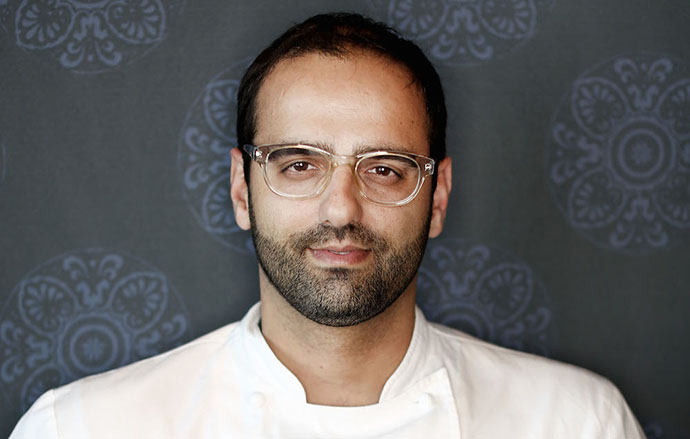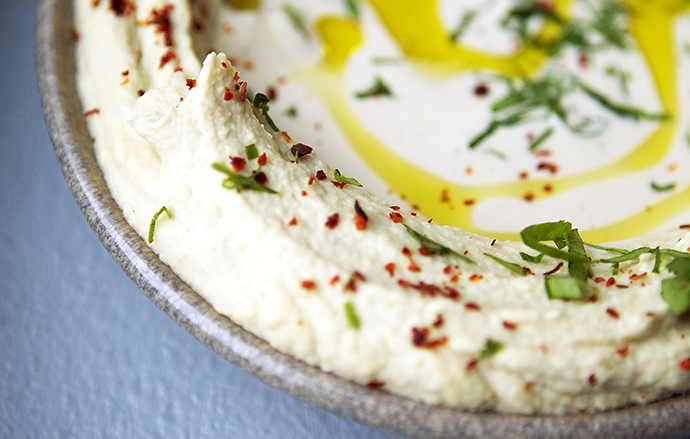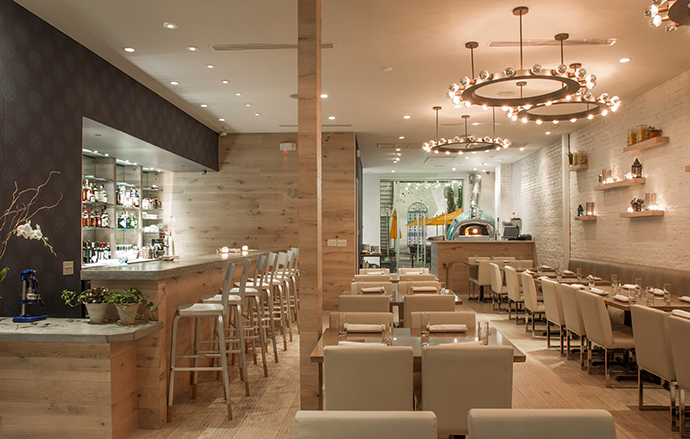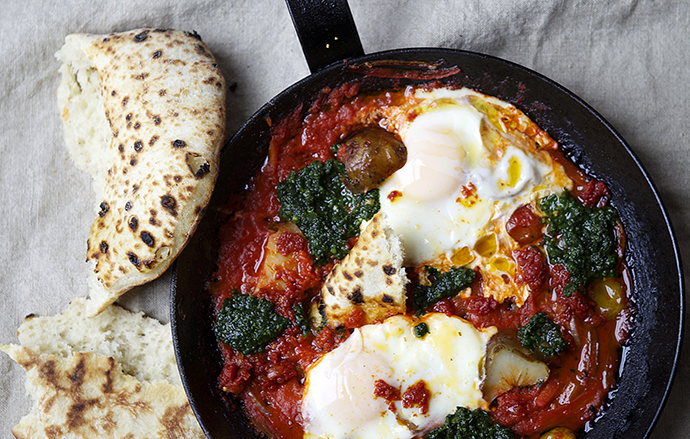Alon Shaya on Modern Israeli Cuisine + New Orleans Fare
Elena North-Kelly
Elena North-KellyApril 21, 2016

The phrase “New Orleans cuisine” may not conjure images of crispy halloumi with caramelized celery root and pomegranate molasses; shakshuka with chermoula and Jerusalem artichokes; or matzoh ball soup with escarole and slow-cooked duck. Yet one of the most coveted tables in the Crescent City is at Alon Shaya’s eponymous eatery, Shaya, a 2016 JBF Award nominee for Best New Restaurant. Shaya and his team blend the indigenous flavors of Israel with locally sourced ingredients and Louisiana culinary traditions, and their efforts have garnered acclaim from all corners of the industry. We caught up with last year's Best Chef: South award winner to learn about his love affair with wood-roasted cabbage, how Hurricane Katrina changed the course of his life, and his favorite Big Easy eats.
--
JBF: What does modern Israeli cuisine mean to you?
Alon Shaya: It’s the culmination of several different cultures and cuisines coming together in a small country. The way those cultures coexist with each other and the cuisine that is born from that is the real beauty of what Israeli food is and what it’s becoming. To name a few, Yemenite, Russian, Greek, and Moroccan cuisines are major contributors to what I consider modern Israeli food to be.
JBF: Talk to us a little bit about the interplay between locally sourced New Orleans ingredients and the indigenous flavors of Israel you work with. Are there any challenges there?
AS: We have amazing local ingredients here in Louisiana due to our mild subtropical climate. It’s a similar climate to Israel, so we get to share many of the same ingredients, like citrus and okra. There’s actually a lot of overlap and it’s been easy to stay true to the flavors of Israel with our local climate. The challenges come with the spices, which we don't as well as in Israel. They pay a lot of attention to the quality of their spices and spice mixes. For that, we look to our friend Lior Lev Sercaz from La Boîte in New York City. He does a great job at filling in that blank for us.

JBF: Shaya is known for its wood-fired pita; hummus variations; our favorite avocado toast; and slow-cooked lamb with whipped feta, to name a few. Is there a lesser-known dish on your current menu that you’re really excited about right now?
AS: We are running a wood-roasted cabbage with muhammara, hazelnuts, and tahini that is out-of-control good. It reminds me of my grandmother’s stuffed cabbage that’s braised in tomatoes, but with cleaner and more defined flavors. The cabbage caramelizes really nicely in the wood-burning oven, and when scooped up with the creamy and spicy muhammara and the crunchy hazelnuts, it’s just everything you want it to be.
JBF: Shaya has also become known for the Jewish holiday meals you put on, with dishes like apple–walnut latkes during Chanukah and veal brisket with root vegetables for Rosh Hashanah. Do you have anything special up your sleeve for Passover?
AS: We will be making Seder plates that you would actually want to eat the food from, instead of just using it for ceremonial purposes. Instead of a lamb shank bone representing the sacrificial lamb, we are doing smoked lamb ribs with all of the meat still on the bone for you to enjoy. Instead of a parsley sprig to dip into saltwater to represent the tears of the Jews in exile, we are making a tabbouleh and sprinkling some sea salt over the top. There will be a bitter greens salad with red chiles and olive oil, too. It’s a fun way to show off the traditional, symbolic foods while making them part of the dining experience.

JBF: You moved from Israel to Philadelphia at age of four and have said that you struggled with finding your identity during your youth, only feeling at home and comfortable in your own skin in the kitchen. What is one of your earliest, defining food memories?
AS: When I was in first grade, I came home to find my grandmother (who was visiting us from Israel) roasting peppers and eggplants over an open flame in our kitchen. The aroma of the charred vegetables really hit me the second I opened the front door. It didn't register with me that she was cooking dinner at the time, as much as I just felt happiness that she was there and that our family was back together. But I really connected food and cooking with happy moments as I grew older. When I ate a new ingredient or cooked with my family, it was a positive experience for me. Eventually, I was able to bring joy and receive compliments from people when I cooked for them. I wasn't really impressing anyone with my English literature skills, so cooking and food became the only trick up my sleeve.
JBF: You've stated that Hurricane Katrina made you rethink your whole life. How did it impact your next steps?
AS: Katrina reminded me that I was put on this earth to bring comfort and happiness to people through food. I stopped thinking about cooking as a way to feed my ego or as a way to invent the next big thing, and instead I focused on providing someone with a meal that they would want to eat or need to eat in that particular moment. It was an opportunity for me to hand someone a hot plate of red beans and rice and make them feel something greater than just lunch. I would see it in their eyes; they were truly hungry and needed nourishment after days of rescuing people or waiting to be rescued. It eventually drew me to Italy to learn the basic techniques of regional Italian cooking from Italian grandmothers. There, I learned the culture behind the food, the reason certain things are eaten at certain times of the year. I saw what families ate when they sat down for a meal together and why hazelnuts are important in Piemonte and lemons are important in Sorrento. Katrina was my wake-up call to go back to the roots of food.

JBF: What are some of your favorite places to dine out in NOLA when you’re not working? And what do you order there?
AS: I love a Vietnamese restaurant called Tan Dinh. It’s a no-frills place, with amazing fried tofu with lemongrass and chiles and killer grilled beef spring rolls. I also love going to Bevi Seafood Co. for boiled crawfish and po’ boys. I love the food that David Slater is cooking at Emeril’s. He makes the best barbecued shrimp and fried chicken I’ve ever had in my life! And I love Mosca's for old-school creole Italian. Bring quarters for their jukebox so you can pump Louie Prima while eating spaghetti with garlic and oysters!
JBF: When we last saw you at JBF Taste America, you were on your way to Israel to do research for your restaurant. What was your biggest takeaway from that trip?
AS: The kebabs I had at Shisko restaurant in Tel Aviv were life-changing! I came back and tweaked our recipe right away!
Learn more about the 2016 James Beard Awards.
--
Elena North-Kelly is managing editor at the James Beard Foundation. Find her on Twitter and Instagram.




-57 web.jpg)


